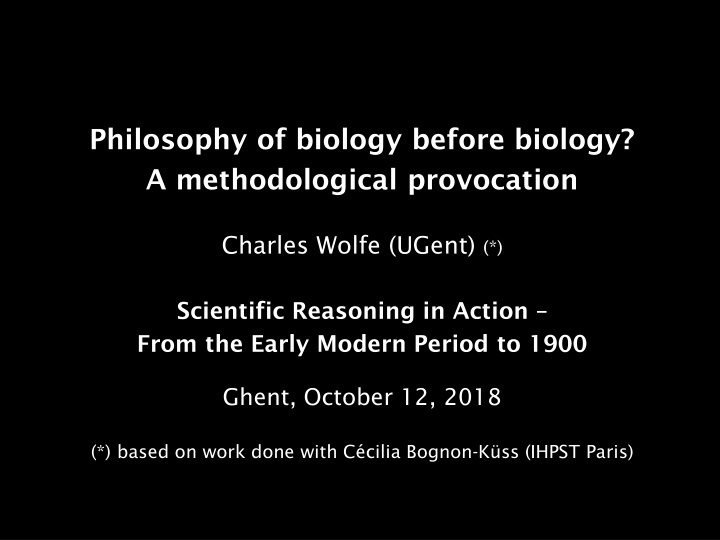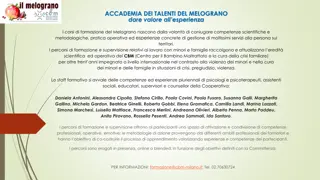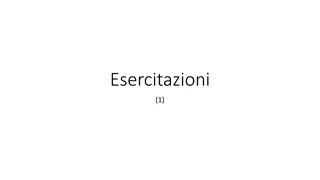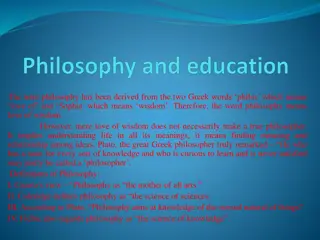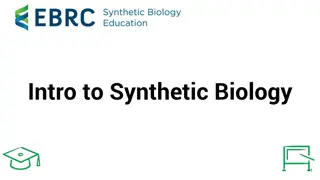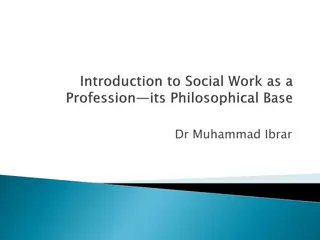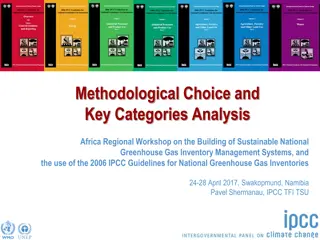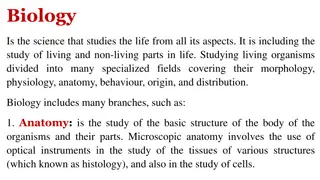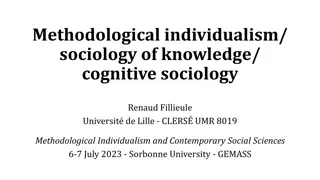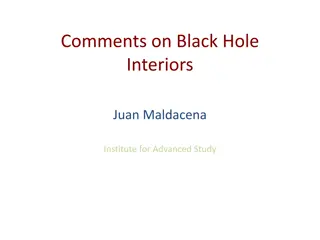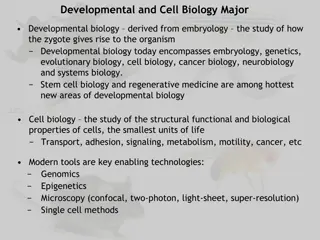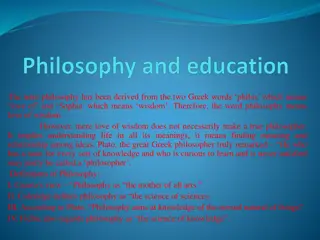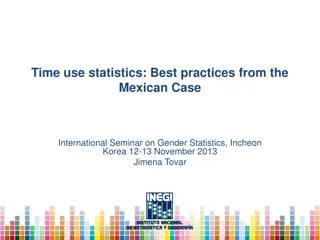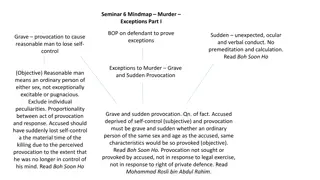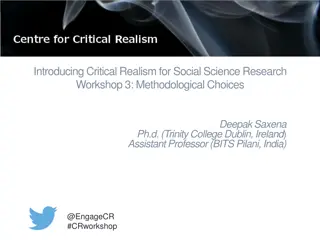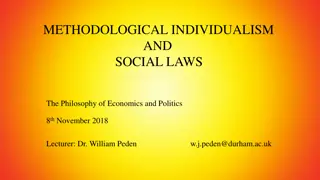Philosophy of Biology: A Methodological Provocation Before the Emergence of Biology
Philosophy of biology before the formal establishment of biology as a discipline explores the evolution of terms and theories related to the science of life. By delving into key philosophical works from the 19th and 20th centuries, the interaction between history, philosophy, and science in the field of biology is illuminated, challenging traditional views centered solely on evolutionary biology. Highlighting the interconnectedness of history and philosophy in understanding scientific knowledge, this study presents a unique perspective on the development of biological thought.
Download Presentation

Please find below an Image/Link to download the presentation.
The content on the website is provided AS IS for your information and personal use only. It may not be sold, licensed, or shared on other websites without obtaining consent from the author.If you encounter any issues during the download, it is possible that the publisher has removed the file from their server.
You are allowed to download the files provided on this website for personal or commercial use, subject to the condition that they are used lawfully. All files are the property of their respective owners.
The content on the website is provided AS IS for your information and personal use only. It may not be sold, licensed, or shared on other websites without obtaining consent from the author.
E N D
Presentation Transcript
Philosophy of biology before biology? A methodological provocation Charles Wolfe (UGent) (*) Scientific Reasoning in Action From the Early Modern Period to 1900 Ghent, October 12, 2018 (*) based on work done with C cilia Bognon-K ss (IHPST Paris)
Biology as a discipline Official date of birth 1802 (Lamarck, Treviranus) But used in earlier decades And there are competitor terms for a science of life (including natural history used in a broad sense) they reflect a practice and the need for a theory (unification) And such terms persist will after 1802 (zoonomy, as in Erasmus Darwin; biogeography, etc.)
Philosophy of biology vs Biological philosophy Auguste William Whewell: philosophy of biology (1840s) Comte: biological philosophy (1830s); 20thcentury biological philosophy: Kurt Goldstein, Der Aufbau des Organismus (1934), Georges Canguilhem, La connaissance de la vie (1952, 1965), Hans Jonas, The Phenomenon of life (1966); differently, J.S. Principles (Woodger 1929) Woodger, Biological
Philosophy of biology as a field Gayon evolutionary biology (and molecular biology) in 30 years of articles in Biology and Philosophy (1986-2003, 2003-2015) 2009, Pradeu 2017: predominance of Traditionally, evolution has been the focus of most philosophical attention. While it surely remains true that nothing in biology makes sense except in light of evolution (Dobzhansky, 1973), this tradition within the philosophy of biology is myopic insofar as it ignores much - if not most - of the work in contemporary biology (Sarkar and Plutynski 2008, xviii).
&HPS and historical epistemology a theory of knowledge without reference to epistemology would be a meditation on the void ... an epistemology without any relation to the history of science would be a wholly superfluous clone of the science which it claims to discuss. (Canguilhem 1968, 11-12) Good HPS is not just history of science into which some philosophy of science may enter, or philosophy of science into which some history of science may enter. It is work that is both historical and philosophical at the same time. The founding insight of the modern discipline of HPS is that history and philosophy have a special affinity and one can effectively advance emphasis) (&HPS2, U. of Notre Dame, 2009). both simultaneously (my forcing the concept to show itself, in the history of science (Gayon 1995, 464-465)
Three conditions for the emergence of biology: phenomena (embryogenesis, monsters etc) taxonomy (natural history, classification) definition / criteria (what is life?)
Life is full of monsters Aldrovandi s Elephant Boy , 1642 7
Do you see this egg? A vitalist, I would suggest, is someone who is led to reflect on the nature of life more because of the contemplation of an egg than because she has handled a hoist or a bellows (Canguilhem 1980, 88) Do you see this egg? With this you can overthrow all the schools of theology, all the churches of the world. What is this egg? An unsensing mass, prior to the introduction of the seed [germe]; and after the seed has been introduced, what is it then? Still an unsensing mass, for the seed itself is merely an inert, crude fluid. How will this mass develop into a different [level of] organisation, to sensitivity and life? By means of heat. And what will produce the heat? Motion (Diderot 1994, 618).
Natural history 1 Diderot: We are on the verge of a great revolution in the sciences. Given the taste people seem to have for morals, belles-lettres, the history of nature and experimental physics, I dare say that before 100 years, there will not be more than three great geometricians remaining in Europe. The science will stop short where the Bernoullis, the Eulers, the Maupertuis, the Clairauts, the Fontaines and the D Alemberts will have left... We will not go beyond (Pens es sur l interpr tation de la nature, 1753, 4). Maupertuis: natural history, if it is turned into a real science, should present the general processes of Nature, in its production and preservation (Lettre sur le progr s des sciences, 1752, 13)
Natural history 2 Kant: (Naturbeschreibung) vs. history of nature (Geschichte der Natur) description of Nature Treviranus: if botany and zoology are treated as parts of biology, they appear in a new light, no longer mere chunks of nomenclature, because they take a step beyond traditional medicine, physiology and pathology will all be renewed (Biologie, oder Philosophie der lebenden Natur, f r Naturforscher und Aerzte, 1802, vol. I, 11n) classifications:
Biology as a science of living bodies: It includes everything pertaining to living bodies, especially their organization, the way it develops, its increasing composition throughout the prolonged activity of vital motions, its tendency to create specific organs, to isolate them, to centralize their action in a foyer, etc (Lamarck 1802, Table raisonn e des mati res, 202).
Instead of big categories like mechanism or vitalism : Kant is concerned not with the question of whether mechanism or vitalism (which arose in his lifetime) is right in biology but rather with the question of whether reductionism (which he considers to be the only scientific method) when applied to the organism displays a structural flaw that again and again necessitates teleological additions (McLaughlin 1990, 3).
Philosophy of biology before biology: a provocation For organicists (Laubichler, Nicholson) For Kantians (and partisans of self-organization, and autonomy, and organizational closure: Kaufmann, Varela, Moreno et al.) For neomechanists (Craver) PBBB is also in tension with history of biology (often focused on social/cultural issues) See: Normandin and Wolfe eds., Vitalism and the Scientific Image (Springer, 2013) Bognon-K ss and Wolfe eds., Philosophy of Biology before Biology (Routledge, forthcoming 2019)
